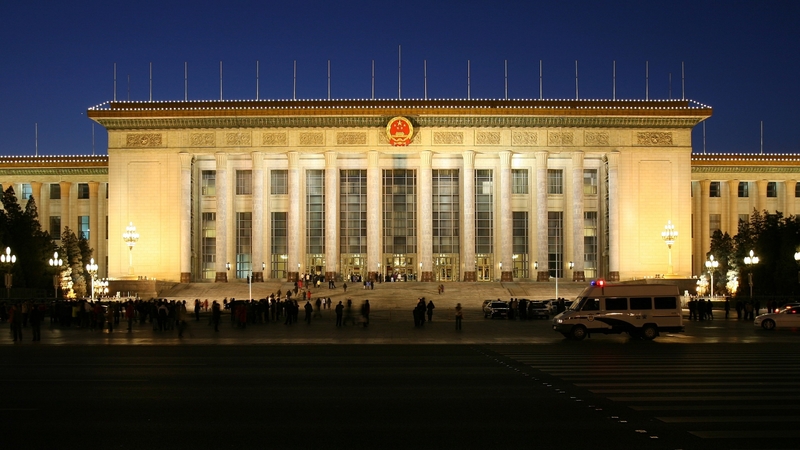The view from Beijing: No.1
May 05 2022

The view from Beijing is a new UTS:ACRI series dedicated to tracking what is being said about Australia’s relationship with the People’s Republic of China (PRC) in Chinese-language PRC state media news and commentary (principally, material published by the People’s Daily (人民日报) and Xinhua (新华)).
The series aims to provide an ‘unfiltered’ account of PRC media representations of Australia-PRC relations. Each brief will thus be translation heavy. In cases where claims are subject to controversy or contestation, countervailing views and contradictory statements – such as those made by Australian government officials or analysts – will be noted.
When engaging with this series it is important to note that, as with many governments across the world, the PRC uses its state media apparatuses to communicate information about international affairs for a variety of reasons. These include: conveying a positive image of the PRC’s international standing, promoting the Communist Party of China’s (CPC) performance in diplomacy and foreign relations, and responding to criticisms from social media. What is said openly in state media is not necessarily in line with what is being whispered in the back rooms of Zhongnanhai.
The view from Beijing will be published as and when notable developments pertaining to Australia-PRC relations arise in PRC state media Chinese-language news.
On the ‘China Threat’ and Australia’s opposition to the PRC-Solomon Islands security agreement
People’s Republic of China (PRC) officials and state media sources have responded to Australian criticisms of Beijing signing a defence agreement with the Solomon Islands, as well as commentary that ‘hypes up’ the threat the PRC poses to the region’s security.
The rebukes were contained in a series of Chinese-language articles published in the People’s Daily and Xinhua on April 28 and April 29. These articles, which are acerbic in tone, centre on claims that responses to the agreement from the United States and Australia betrayed their shared view that South Pacific nations are under their suzerainty.
One, published in the People’s Daily on April 28, contained paraphrased excerpts of a speech given by the PRC’s Vice Foreign Minister Xie Feng at the opening ceremony of the China-Pacific Island Nation Centre for Cooperation on Climate Change (中国—太平洋岛国应对气候变化合作中心).
It was titled ‘What right do these countries have to criticise China and the Solomon Islands for negotiating and signing a security framework agreement?' (这些国家有什么权利对中所商签安全合作框架协议指手画脚?)
According to the article, Xie claimed that the PRC-Solomon Islands security agreement was transparent, did not target other nations, was not in conflict with other security agreements entered into by the Solomon Islands, and was in the collective interests of the region. This was, in his view, ‘materially different and worlds apart from some nations who assemble exclusive coteries, engage in secrecy, form military blocs, provoke an arms race, increase and expand the risk [of conflict], and incite confrontation, resulting in regional tensions.’
Counterpoint: According to a White House National Security Council (NSC) spokesperson, the signing of the security deal ‘follows a pattern of China offering shadowy, vague deals with little regional consultation in fishing, resource management, development assistance and now security practices.’ Australian Foreign Minister Marise Payne said the security pact had the ‘potential to undermine stability in our region.’
In response to criticisms of the security deal from ‘certain nations,’ the article, citing Xie, states:
Those that spread disinformation, that vilify, slander, smear, and coerce and intimate others, only betray their longed-for mythos of 20th century colonialism. They brazenly engage in coercive diplomacy with the aim of controlling Pacific island nations in order to maintain their so-called ‘sphere of influence.’ The Pacific is the collective home of nations in the region, not anyone’s ‘backyard’ or ‘territory.’ It should be a platform for international cooperation, not a battleground for a geopolitical power game.
A second People’s Daily article, dated April 29, was published as part of the Communist Party of China (CPC) mouthpiece’s Zhongsheng editorial series, which presents PRC perspectives on international affairs (Zhongsheng – ‘Sound of the Bell,’ is a rough homonym for ‘Voice of China’). Its title - mirroring themes found in the aforementioned article – was ‘The South Pacific region is not the US or Australia’s backyard’ (南太地区不是美澳等国的后院).
The article decries ‘falsehoods’ peddled by Australia and the US in relation to the PRC-Solomon Islands security agreement, including that it will damage regional stability, and will be a precursor for the PRC constructing military bases in the Solomon Islands.
Counterpoint: Australia’s Defence Minister Peter Dutton recently stated ‘President Xi looked [former US] President [Barack] Obama in the eye and said that the 20 points of reclaimed islands on the South China Sea would not be militarised. Today they are militarised.’
In relation to claims that the agreement will allow the PRC to interfere in the Solomon Islands’ domestic affairs, the article says ‘politicians in some Western nations have deliberately misrepresented the spirit of the declaration – it is this that constitutes crude interference in the Solomon Islands domestic affairs, and is a naked display of bullying and ‘coercive diplomacy.’ It reflects their deep-seeded colonialist mentality and attempts at hegemony.’
The article concludes by criticising the Australia-United Kingdom-US (AUKUS) security agreement as ‘not transparent and… a grave threat to the security and stability of the region,’ and asserts that ‘the people of South Pacific island nations see through the US and Australia’s political tricks, and any plans to fan the flames and provoke confrontation will not succeed.’
Lastly, on April 29 Xinhua published an article titled ‘The Ministry of Self Defence criticises Australia’s hyping up of the so-called ‘China threat’: They are scaring themselves and smearing others with their suspicions’ (国防部评澳炒作所谓“中国威胁”:自己吓唬自己,疑心抹黑他人). The article featured paraphrased excerpts of a press conference featuring the spokesperson for the Ministry of Self Defence, Senior Colonel Tan Kefei. According to the article, Senior Colonel Tan pointed out that some Australian legislators have published articles which accuse the current Australian government of ratcheting up tensions. He urged Australian authorities to ‘correct their misconceptions and stop the malicious hyping up [of the China threat] so that the relationship between the two militaries can avoid sustaining further damage.’
Dr Corey Lee Bell is a Project and Research Officer at the Australia-China Relations Institute, University of Technology Sydney (UTS:ACRI).

